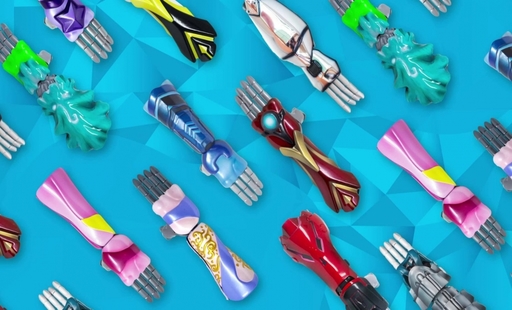How Limbitless Solutions Empowers Children & Champions Accessibility
By: Veronica Figueroa Fernandez, PRSA Orlando Diversity & Inclusion Chair
“Inclusive design doesn’t mean you’re designing one thing for all people. You’re designing a diversity of ways to participate so that everyone has a sense of belonging.” – Susan Golstman
Meaningful, inspiring storytelling and advocacy in communications play an essential role in advancing Limbitless Solutions’ mission to provide wider access to expressive and affordable 3D-printed bionic arms for children.
Limbitless was founded in 2014 by Dr. Albert Manero and a group of students after a mother reached out to Manero for help in creating a prosthetic arm for her son. Manero and the team found an affordable alternative by using 3D-printed material and sensor stickers to be placed on the child’s skin to activate the prosthetic when muscles are flexed. Limbitless has since become a nonprofit organization based at the University of Central Florida and has enhanced the capabilities and design of their prosthetic arm. The non-profit gained notoriety after partnering with Iron Man himself, Robert Downey Jr., to deliver a prosthetic arm to then 7-year-old Alex, who was born with a partially developed right arm.
PRSA Orlando’s August program featured Limbitless Solutions’ President Dr. Albert Manero and Brand Director Ms. Mrudula Peddinti, who discussed the important role advocacy plays in empowering bionic kids and championing accessibility in any circumstance.
Here are some highlights:
Approach to inclusive and accessible design:
- Personalization and expression are important to Limbitless Solutions who believe bionic arms are an extension of a person and should be bold, powerful, and exciting.
- The team at Limbitless found that the children receiving the bionic arms wanted to stand out and that by giving the children the ability to design their own arms gave them a sense of ownership and belonging. The organization noticed a change in the way children interacted with the world after receiving their bionic arm.
- Limbitless uses the term “bionic arms” in their branding because their recipients, “bionic kids” are all superheroes and it ties with their mission of empowerment, inclusivity and accessibility.
- They also created a smartphone app integration when they realized their desktop platform wasn’t as inclusive and accessible. The app helps children calibrate the bionic arms, and answers questions, among other features.
Messaging during unprecedented times:
- One of the first things Limbitless did when they asked their employees to work remotely during the global pandemic was to reflect internally and place a larger focus on internal communications, as well as the mental health and sustainability of the team.
- When pivoting from bionic arms to supporting hospitals and first responders by creating face shields, mask extenders and a prototype for a 3D-printed ventilator, Limbitless began to release information slowly, making sure that the focus was on the bigger picture and not on their team.
- According to Manero, Limbitless has taken a quieter voice to listen to the community and portray a message of inclusion. He observed that there are many areas where your messaging can become a pitfall and recommends companies to listen first and then move to empathy.
The benefits of a diverse team:
- From 2015 to 2020, Limbitless has worked with over 165 students and faculty, representing nine UCF colleges. The spring 2020 semester saw 35 student interns focused on engineering, film, digital design, studio art, advocacy and media, game design, outreach and logistics, and computer programming. The breakdown was 60 percent female and 40 percent male.
- Limbitless credits its interns for many of its ideas. “They haven’t just come to the table, they’ve helped build the table.” Peddinti, who began as an intern, rebuilt the website and made it more user-friendly. Interns have contributed to arm design, launching the blog and giving the organization a social media presence, magnetization of the arms, and much more. “That’s the beauty of having a diverse set of perspectives. You get creative ideas and transform the program.”
What’s on the horizon:
- The organization hopes to debut an expanded Learning Lab in 2021, continue research on Project Xavier, and expand bionic arms to adults, including to veterans and first responders.
Action items to promote inclusivity in the limb difference community and beyond:
- “Become aware that we are all different from each other, and that is a beautiful thing.” Instead of operating in a loss or defect mindset and asking children questions such as, “how did that happen?” or “did it hurt?” have authentic conversations that are not defect focused, such as saying, “that is so cool! How does it work?” Help children adapt to their circumstances because the lack of inclusion and acknowledgement can be isolating.
- In accepting that we are different, we can move beyond insensitive wording and create communication that is inclusive of our many diverse audiences.
The August program was sponsored by Curley & Pynn Public Relations.



